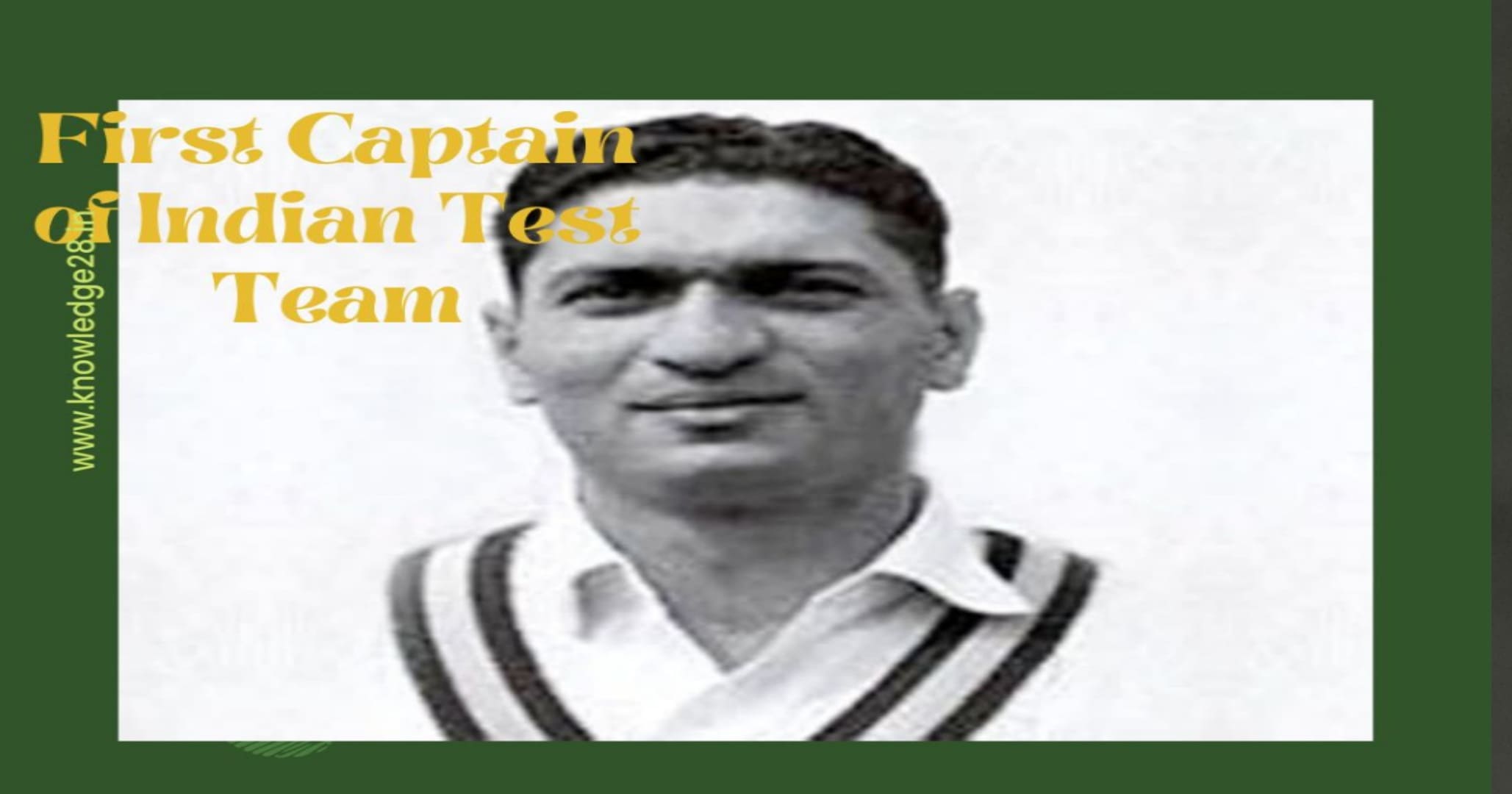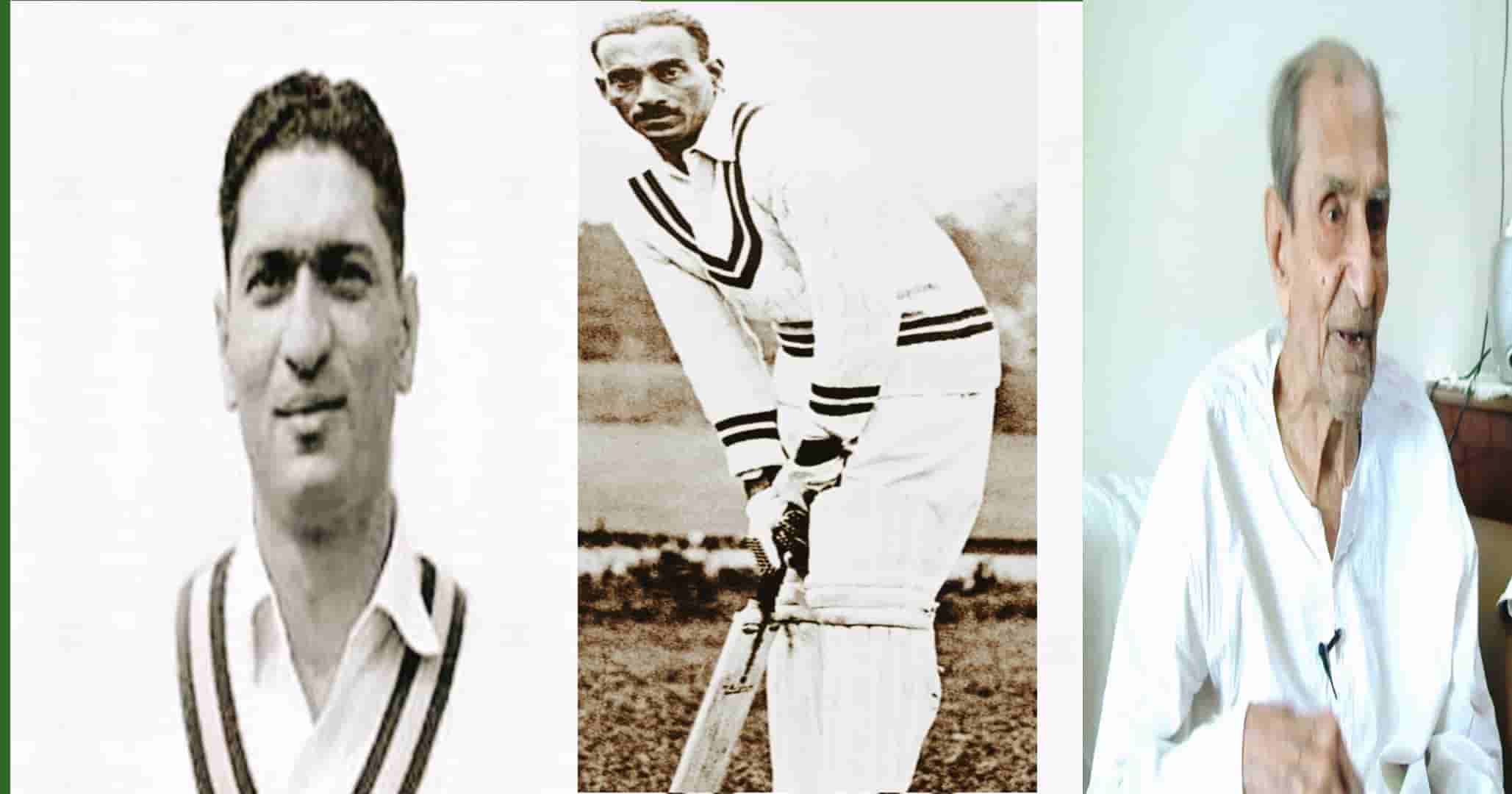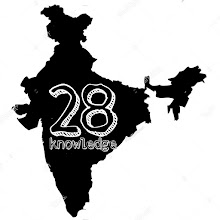This article describes who was the first captain of Indian Test team, his personal life, his career and everything about him.
 |
| First Captain of the Indian Test Team |
| First Captain of Indian Test Team | |
|---|---|
| Name | Cottari Kanakaiya Nayudu |
| Gender | Male |
| Born | 31 October 1895 |
| Birth Place | Nagpur, Central Provinces, British India |
| Father | Kothari Surya Prakash Rao Nayudu |
| Mother | Mahalaxmi |
| Died | 14 November 1967 (aged 72) |
| Height | 6 ft 2 in (188 cm) |
| Batting | Right-handed |
| Bowling | Right-arm slow-medium |
| National side | India (1932–1936) |
| Test debut (cap 7) | 25 June 1932 v England |
| Nationality | Indian |
| Domestic team information | |
| Team | Years |
| Hindus | 1916/17–1940/41 |
| Madras | 1926/27 |
| Hyderabad | 1931/32 |
| Central Provinces-Berar | 1932/33–1938/39 |
| Central India | 1934/35–1937/38 |
| Holkar | 1941/42–1952/53 |
| Andhra | 1953/54 |
| Uttar Pradesh | 1956/57 |
First Captain of Indian Test Team?
The first captain in Test matches was Cottari Kanakaiya Nayudu of the Indian cricket team. He led the Indian team in their inaugural Test series against England in 1932. The first Test match for India was played from June 25 to June 28, (1932) at Lord's Cricket Ground in London. Cottari Kanakaiya Nayudu was a prominent cricketer and is often considered one of India's cricketing pioneers.
Background of the First Captain of Indian Test Team
Cottari Kanakaiya Nayudu, commonly known as C.K. Nayudu, was a legendary Indian cricketer and one of the pioneers of Indian cricket. He was born in Nagpur on 31 October 1895. C. K. Nayudu was a right-handed batsman and a right-arm medium-paced bowler.
Nayudu is often regarded as one of India's greatest cricketers before India gained Test status. He played a vital role in popularizing the sport in the country and inspired several generations of cricketers. He was a fearless and aggressive batsman known for his powerful stroke play and ability to counter fast bowlers.
Some of the key highlights of C.K. Nayudu's cricketing career include:
First Indian Test Captain: As mentioned earlier, Nayudu was the captain of the Indian cricket team in their debut Test series against England in 1932 at Lord's.
First Century by an Indian in Test Cricket: In the same Test series against England, Nayudu became the first Indian to score a century in Test cricket. He scored a magnificent 102 runs at Lord's, a feat that holds great significance in Indian cricket history.
Tour of Australia: Nayudu also led the Indian team on a tour of Australia in 1947-48, which was India's first official Test series after gaining independence. Despite being past his prime, he displayed great resilience and contributed with both bat and ball during the tour.
Contribution to Indian Cricket: Nayudu played a vital role in nurturing young talent and promoting the sport at the domestic level. He was instrumental in developing the Holkar Trophy, a prestigious domestic cricket tournament in India.
C.K. Nayudu's contributions to Indian cricket were immense, and he remains a revered figure in the cricketing history of the country. He passed away on November 14, 1967, leaving behind a lasting legacy as one of India's cricketing pioneers and an inspiration to generations of cricketers.
Career of the First Captain of Indian Test Team
C.K. Nayudu's cricket career spanned several decades, and he achieved numerous milestones during his time as a cricketer. Here are some key aspects of his illustrious career:
Domestic Cricket: Nayudu made his debut in first-class cricket in 1916 while representing Central Provinces (now known as Madhya Pradesh) in the Bombay Triangular tournament. He played for various teams in domestic cricket, including Baroda, Holkar, and United Provinces (now Uttar Pradesh).
Captaincy: Nayudu was an astute leader and captained several domestic teams during his career. He led the Holkar team in the Ranji Trophy and played a significant role in developing cricket in the region.
India's First Test Series: In 1932, he led the Indian cricket team on its first-ever Test tour to England. The team played a four-match Test series against England, with Nayudu captaining the side in three of those matches. He was not just the captain but also the batting mainstay of the team.
First Century by an Indian in Tests: As mentioned earlier, Nayudu scored the first-ever Test century by an Indian cricketer during the Lord's Test in 1932. His innings of 102 was a memorable moment in Indian cricket history.
All-round Skills: Nayudu was not just a proficient batsman but also a useful medium-paced bowler. His bowling was more than handy, and he often contributed crucial breakthroughs for his team.
Tour of Australia: In 1947-48, Nayudu captained the Indian team on their tour to Australia, which marked India's first Test series after gaining independence. Despite his advancing age, Nayudu's passion for the game and his leadership skills were evident during the tour.
Overall Legacy: C.K. Nayudu's career laid the foundation for cricket in India. He inspired a generation of cricketers and played a crucial role in popularizing the sport in the country. His achievements and contributions are considered pivotal in India's cricketing journey.
After retiring from active cricket, Nayudu remained involved in the game as a coach and administrator. His impact on Indian cricket continues to be celebrated, and he is remembered as one of the trailblazers who paved the way for the sport's growth in the country.
Style and Technique
C.K. Nayudu was a stylish and aggressive right-handed batsman known for his powerful stroke play and fearless approach. His batting technique and style were well-regarded during his time, and he had a significant impact on Indian cricket with his aggressive brand of play. Here are some aspects of his batting style and technique:
Aggressive Stroke Play: Nayudu was known for his aggressive approach at the crease. He had a wide range of attacking shots and was not afraid to take on the bowlers. His natural aggression made him a thrilling batsman to watch and put pressure on the opposition.
Power Hitting: He possessed immense power in his shots, and his ability to hit the ball with authority was one of his standout traits. Nayudu was known to dispatch even good deliveries to the boundary with ease, making him a formidable batsman.
Strong Defense: Along with his aggressive batting, Nayudu had a solid defensive technique. He could play a tight defensive game when needed, showcasing his versatility as a batsman.
Footwork: His footwork was exemplary, which allowed him to play both fast bowlers and spinners effectively. His nimble foot movement helped him get into the right position to play his shots.
Impactful Captaincy: As a captain, Nayudu led from the front and inspired his team with his aggressive and positive approach to the game. His leadership on the field often reflected in his batting, and he led by example.
Bowling Skills: In addition to his batting prowess, Nayudu was a capable medium-paced bowler. He used his bowling skills effectively to provide vital breakthroughs for his team when needed.
Fearless Attitude: One of the most remarkable aspects of Nayudu's style was his fearlessness. He never shied away from taking on the best bowlers of his time, irrespective of the situation.
It's important to note that cricket during Nayudu's era was significantly different from modern-day cricket. The pitches, equipment, and playing conditions were vastly distinct, and comparisons to contemporary players need to be made with these factors in mind. Nevertheless, C.K. Nayudu's contributions to Indian cricket, both as a player and captain, remain invaluable, and his aggressive style of play left a lasting impact on the sport in the country.
Personal Life of the First Captain of Indian Test Team
Information about C.K. Nayudu's personal life is relatively limited compared to his cricketing career. Here are some known details about his personal life:
Family: Cottari Kanakaiya Nayudu was born on October 31, 1895, in Nagpur, which was part of the Central Provinces (now in the state of Maharashtra, India). He hailed from a prominent cricketing family, and his brothers, C.S. Nayudu and C.R. Nayudu, also played first-class cricket.
Education: Nayudu attended the Morris College in Nagpur, where he honed his cricketing skills. He later became a physical education instructor.
Nickname: Nayudu was affectionately called the "Colossus of Indian Cricket" due to his towering presence and immense impact on Indian cricket during its early days.
Contribution to Holkar State: Nayudu served as the captain of the Holkar cricket team, which represented the Holkar State (now part of Madhya Pradesh) in domestic competitions. He played a crucial role in nurturing cricket talent in the region and contributed significantly to the growth of the sport in Central India.
Coaching and Administration: After retiring from active cricket, Nayudu remained associated with the game. He took up coaching and also served as an administrator, helping develop cricket in various capacities.
Awards and Honors: In recognition of his contributions to Indian cricket, Nayudu received the Padma Bhushan, India's prestigious civilian award, in 1956.
Passing: C.K. Nayudu passed away on November 14, 1967, at the age of 72. His legacy as one of India's cricketing pioneers and a fearless cricketer remains an integral part of the country's cricketing history.
While C.K. Nayudu's personal life remains somewhat less documented compared to his cricketing career, his impact on Indian cricket and his lasting legacy as a trailblazer continue to be celebrated in the annals of the sport's history in India.
Reputation and Legacy of the First Captain of Indian Test Team
C.K. Nayudu's reputation and legacy in Indian cricket are nothing short of iconic. He holds a special place in the hearts of cricket enthusiasts, and his contributions to the game have left a lasting impact. Here are some key aspects of his reputation and legacy:
Pioneer of Indian Cricket: C.K. Nayudu is often regarded as one of the pioneers of Indian cricket. He was part of the first Indian Test team and led the side in its inaugural Test series. His involvement in India's early cricketing journey played a crucial role in establishing the sport's foundation in the country.
First Century in Test Cricket for India: Nayudu's century at Lord's in 1932 was not just the first-ever Test century by an Indian cricketer but also a defining moment in Indian cricket history. It showcased the potential and talent of Indian players on the international stage.
Aggressive and Fearless Batsman: Nayudu's aggressive style of batting, characterized by powerful strokes and fearless approach, made him a thrilling player to watch. He was an inspiration for generations of cricketers who aspired to play with similar passion and courage.
Captaincy and Leadership: As a captain, Nayudu led the Indian team with determination and led by example. His leadership on the field was marked by a positive and aggressive mindset, instilling confidence in his team members.
Contribution to Indian Cricket Beyond the Field: Nayudu's impact on Indian cricket extended beyond his playing days. He played a crucial role in developing and nurturing cricket talent in various regions, notably in Central India. His involvement in coaching and administration helped further the growth of the sport.
Honors and Awards: His contributions to cricket were recognized with the prestigious Padma Bhushan award in 1956. This honor highlighted the significance of his legacy in the national context.
Inspiration for Future Generations: C.K. Nayudu's legacy continues to inspire cricketers in India. His journey from a cricketing pioneer to a legendary figure is a tale of determination, passion, and perseverance that resonates with aspiring cricketers.
Commemoration: Various cricket tournaments, awards, and facilities have been named in his honor to commemorate his invaluable contributions to Indian cricket.
Overall, C.K. Nayudu's reputation and legacy are marked by his pioneering role in Indian cricket, his aggressive and fearless style of play, and his enduring influence on the sport in the country. His name will forever be etched in the history of Indian cricket as one of its true legends.



